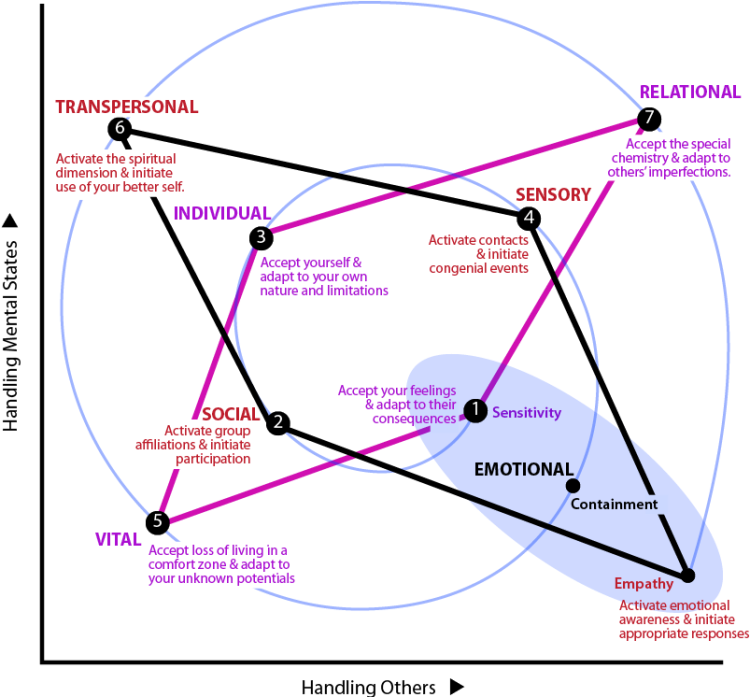The Diamond Pattern
Oscillation: Inwards vs Outwards
In reviewing the source of self-esteem in each , there appears to be an oscillation of attention that is describable as inwards v outwards. See the Table below:
| Mode | Self-esteem Source | Orientation of Attention | Explanation | |
|---|---|---|---|---|
| μ1 | Be genuine | Inwards | The nature of personal feelings can only be found from looking within | |
| μ2 | Be active | Outwards | The way to be acceptably active requires attention to the outer world. | |
| μ3 | Be self-accepting | Inwards | The object to be accepted is always a personal quality, impulse, tendency &c. | |
| μ4 | Be convivial | Outwards | Conviviality must be adapted to the situation and the company. | |
| μ5 | Be disciplined | Inwards | The requirement is to discipline personal impulses that could impede success. | |
| μ6 | Be open | Outwards | Engagement with the cosmos primarily means being open to the environment. | |
| μ7 | Be content | Inwards | Critical or bad feelings about a friend must be put into perspective and forgiven. |
Connection to Past Investigations
Analysis of previous have found that the odd- and even-numbered modes call for different handling:
- The odd-numbered modes call for acceptance and adaptation.
- The even-numbered modes call for exploration and initiation (or activation).
- The final version of acts as if it were «Mode-8», and so takes on an even-numbered quality i.e. in this case, the would have a different quality when it is consistently rather than spontaneously .
It seems appropriate that:
- inner-directed attention accords with acceptance/adaptation to one's own human nature i.e. we cannot easily control our inner life.
- outer-directed attention accords with activation/initiation in the social environment i.e. we have a preference to control the outer world.
The diagram below summarizes the conjectures and reveals the diamond pattern.
Better viewing: Use browser zoom if needed.

 Acceptance/Adaptation
Acceptance/Adaptation
 Activation/Initiation
Activation/Initiation
Reversal : Psychopathology & Sociopathology
In the other Spirals, any attempt to reverse the duality—i.e. to accept-adapt when the requirement is to activate-initiate, or vice versa—meets with a collapse in functioning due to a loss of social support and/or loss of contact with psychosocial reality. By contrast, in , duality reversal may be more enduring, even if at the price of generating dysfunction.
Activation/Initiation (instead of Acceptance/Adaptation)
: The active decision about what emotion to apply in a situation and its artificial activation is typical of a hysterical personality. However, actors and actresses are expected to produce emotions as required.
-: A self-concept may paradoxically reject the true self. Activation of a false self that will be admired by others then occurs. This is the defining characteristic of narcissistic personality disorders. Falsity may also be used by swindlers and others who live by deceiving others as to their true nature.
-: A person may take on challenges under social or family pressure. There is however no great sense of pride, even if there is success and others are admiring. The net effect is exhaustion. A person may feel damaged by the effort rather than being invigorated and strengthened.
-: Endless initiation of relationships occurs where there is a refusal to accept imperfections. This can lead to a series of relationships that fail through discontent with their quality. Alternatively, instead of adapting there is relating through controlling, which often degenerates into emotional abuse.
Acceptance/Adaptation (instead of Activation/Initiation)
: Just accepting a group and adapting fully turns a person into an instrument. Such a person is potentially capable of inhuman behaviour. Totalitarian governments are known to abrogate freedom of association and use membership of a diverse range of interest groups as evidence of disloyalty.
-: Trying to enjoy what others enjoy (but you don't) does not lead to feeling good. Trying to mix in social circles that you happen to find yourself, but where you do not actually fit, is a recipe for discomfort and embarrassment or humiliation.
-: Instead of a natural activation of personal spirituality a person may just accept religious dogma and become a cult-follower. Adaptation to social beliefs and norms weakens personal powers of judgement and choice.
-
Back to Review.
Originally posted: 7-Jan-2016. Last amended:25-Jun-2016.